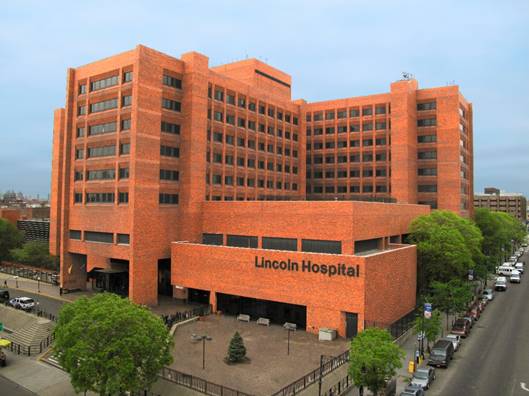Pulmonary embolisms are one of the most common heart and blood vessel diseases and about 33% of people with a pulmonary embolism die before they get a diagnosis and treatment.
Jacobi Medical Center was recently part of a study aimed at reducing those numbers. In March, the Acute Pulmonary Embolism Extraction Trial with The AlphaVac System (APEX-AV) clinical study culminated at 24 facilities nationwide, where Jacobi exceeded expectations by performing eight successful procedures.
A pulmonary embolism is a blood clot that blocks and stops blood flow to an artery in the lung. In most cases, the blood clot starts in a deep vein in the leg and travels to the lung. Rarely, the clot forms in a vein in another part of the body. When a blood clot forms in one or more of the deep veins in the body, it’s called a deep vein thrombosis (DVT). Because one or more clots block blood flow to the lungs, pulmonary embolism can be life-threatening. However, prompt treatment greatly reduces the risk of death.
AngioDynamics, Inc, a medical technology company focused on restoring healthy blood flow in the body’s vascular system, expanding cancer treatment options and improving quality of life for patients, announced the enrollment of the first patient in the APEX trial in October 2022 at Jacobi. The benefits of the APEX-AV study and system are the minimally invasive use of treating patients without requiring major surgical procedures, such as open-heart surgery. By entering through a vein in the thigh, the AlphaVac device is able to be navigated to the clot in someone’s lungs and can then be positioned to extract the blood clot.
“This is really game changing technology,” said Dr. Seth Sokol, the lead primary investigator for the study. “This device allows us to reach blood clots without extensive surgery. It’s truly transformational in the available tools we now have to treat patients while also dramatically reducing recovery time and lowering the risk of major bleeding associated with other therapies such as clot busting drugs.”
Sokol, chief of Jacobi’s cardiology department and director of interventional cardiology, is a part of the hospitals’ Pulmonary Embolism Response Team, which includes a vascular surgeon, an interventional cardiologist, a pulmonologist and emergency medicine and critical care personnel. He hopes APEX will be approved, so it can not only help Bronxites, but people nationwide.
One such patient was Susan Mubiru Kitakule, a 69-year-old home health aide who is a resident in the Norwood community. In October 2022, Kitakule was walking to the bus station when she suddenly collapsed. Fortunately, a good Samaritan witnessed her fall and helped her up. She then called her daughter and took an ambulance to the hospital.
“By the time I got there (the hospital) I was almost fainting,” Kitakule told the Bronx Times.
She came into the hospital with chest heaviness and feeling weak. Her primary doctor noticed something was wrong and called Sokol to examine her. Sokol discovered large blood clots in Kitakule’s lungs on a CT scan.
Sokol told her she was eligible to be part of the study and Kitakule jumped at the opportunity.
“I prayed to God, and I knew they were going to do something to help me,” she said.
Soon after using the AlphaVac device, Sokol and his colleagues removed the clots. Within two days, Kitakule had recovered to the point where she was sent home to be with her children and grandchildren.
Kitakule has already resumed her normal life and returned to work in January 2023.
“I’m amazed at how quick the procedure and my recovery were,” Kitakule said. “The staff were very nice; they answered all my questions and were concerned with my wellbeing.
I recommend this to other people. Imagine a clot being in your lungs, how else are they going to remove it?”






















